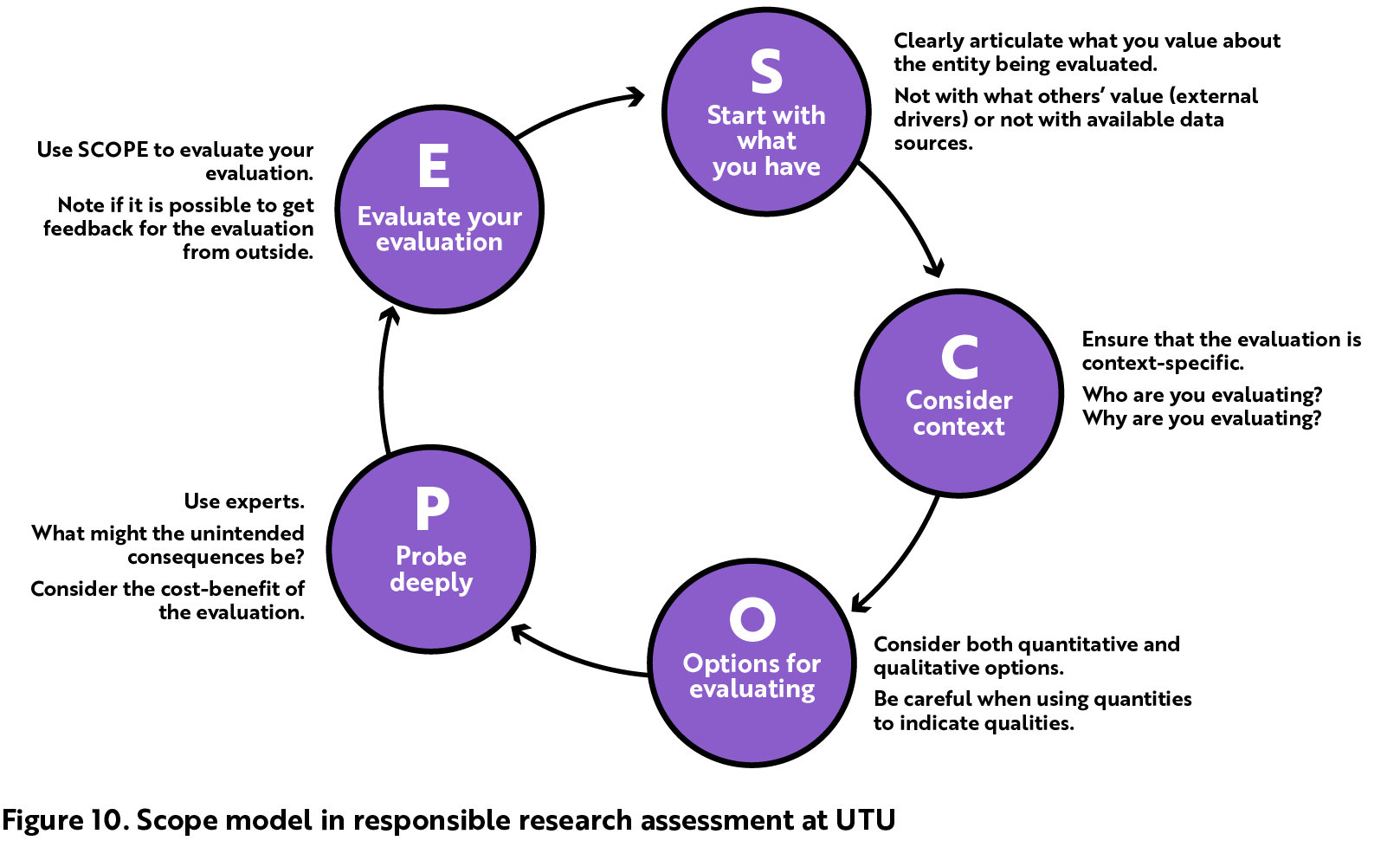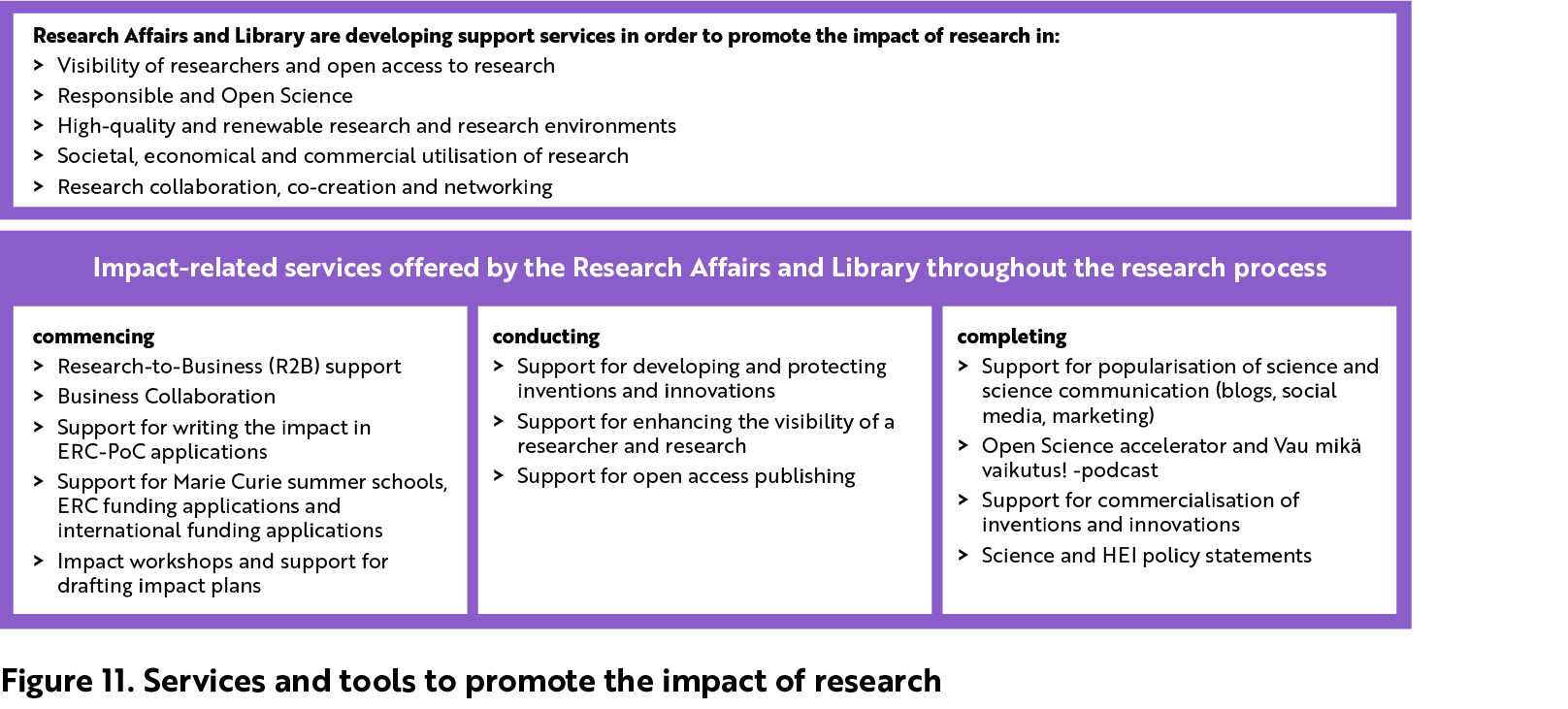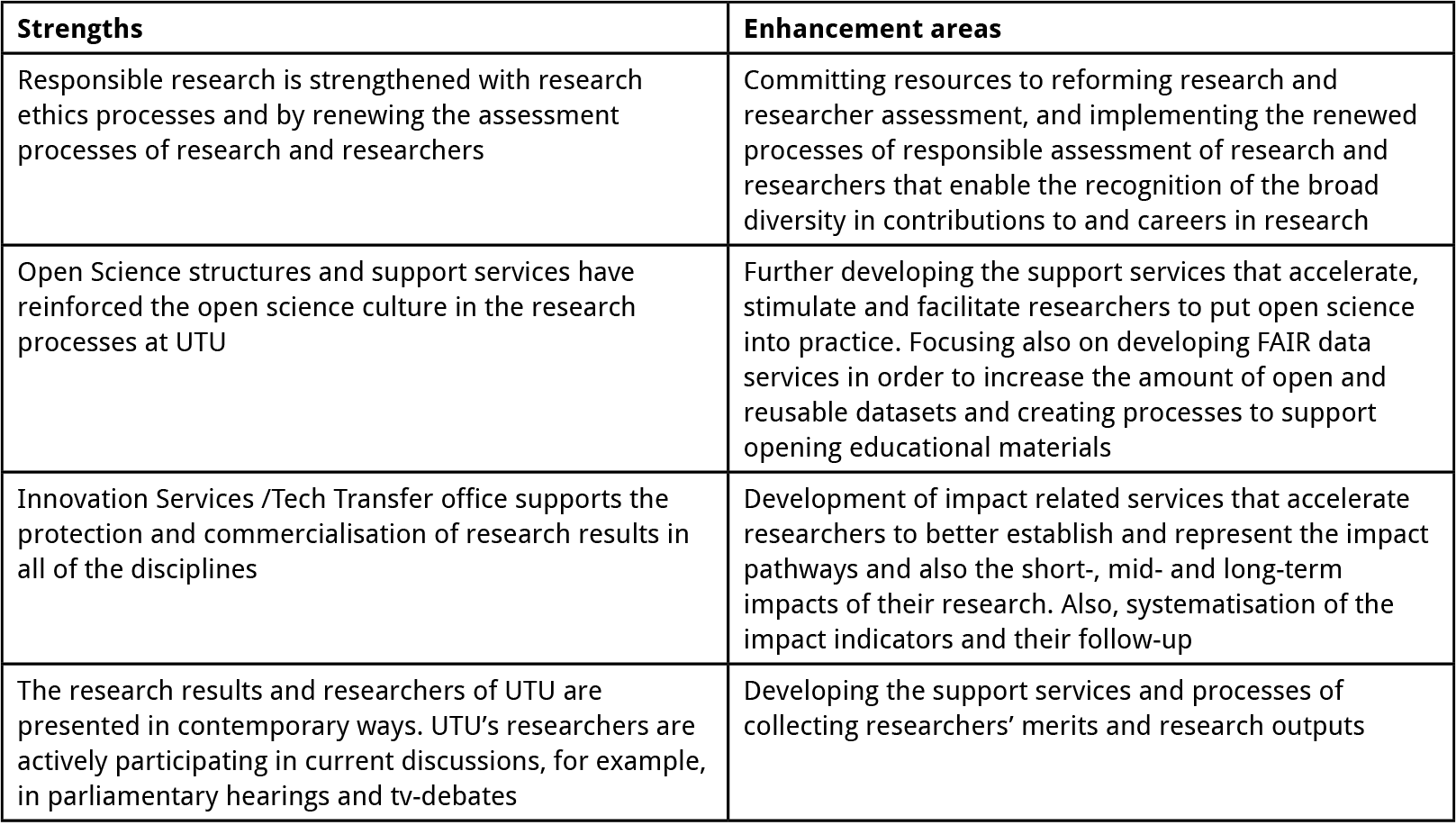UTU has defined targets for research impact and has a clear structure for monitoring research implementation
The University of Turku’s contribution to reforming society is guided by its strategic mission. UTU has defined targets for research impact. The University has a clear structure for monitoring research development through the UTU Research Council. The assessment of research quality is monitored by peer-review processes and through periodic Research Assessment Exercises (RAE).
The RAE 2021–2022 highlighted the need to define multidisciplinarity more clearly and the societal impact of research across all units and faculties. Strategic groups have been set up across faculties working on themes such as AI, digital humanities, socially responsible scientists, and European challenges. Also, the Faculty of Technology is a crucial player in connecting disciplines. Otherwise, multidisciplinary research is carried out, for example, humanities to the medical school and digitalisation, technology to law and biodiversity to leadership. New master programmes are being launched along these lines. Based on the audit visit, faculties vary in conducting multidisciplinary research. Some faculties would consider their internal range of disciplines as a sufficiently broad basis for multidisciplinary work. In other faculties, a broader multidisciplinary approach is still being sought.
The disciplinary structure is still visible in the organisation of most doctoral studies, despite the RAE 2021–2022 recommendation to focus more on UTU’s priority areas. Such an initiative was taken ten years ago but was eventually left to the faculties. Since then, various faculty crossing programmes have been established.
According to the audit interviews, it is felt that doctoral researchers need a home in a faculty or department. According to the audit visit, doctoral researchers could meet a broad range of disciplines within one faculty. The University of Turku’s Graduate School organises joint courses for all doctoral researchers, such as research ethics, societal impact and various annual events.
Multidisciplinarity is seen as the important long-term goal for UTU. However, discussions are ongoing about the amount of steering and the proportion of internal budgets that go directly to faculties compared to multidisciplinary initiatives and structures (e.g. joint institutes). One view is that multidisciplinarity is still implemented too differently across faculties and is too dependent on external funding.
The audit team recommends that UTU should build stronger ties between faculties to achieve multidisciplinarity. It would be imperative to increase horizontal collaboration between all bodies representing different research areas, including provisions for doctoral training. Cross-faculty steering could be further promoted by internal funding for multidisciplinary work and doctoral education.
UTU collects information on the societal impact of research
UTU collects information on the societal impact of research and uses the info for further development. A new vision and mission regarding regional and societal impact is emerging. It is seen as a process that has been going on for a long time, which makes the University more relevant to society. Achievements are in infrastructure built for faculty to engage, creating co-creation platforms. Examples of these are the Faculty of Social Science’s cooperation with the Nordic Youth Panel and INVEST flagship programme for societal impact, externally funded professorships in the Faculty of Technology, and training master and doctoral researchers in areas of societal impact. During the audit visit, various podcasts, social media and trainings for different decision-making bodies were mentioned as other ways to promote research impact.
A key point for the University of Turku is to make the new vision and mission on regional and societal impact acceptable to the academic community. Clearly, things are changing, but the research impact agenda requires an internal change in the faculties and increases workload with reporting. In the faculties, there is also criticism towards promoting research impact. The audit team recommends UTU to continue the debate on the impact of research.
UTU has systematic procedures for ensuring the responsible conduct of research
The UTU lists the following values: creativity, openness, ethical principles, critical thinking and strong community. The audit team sees it will be essential to make these sufficiently explicit to ensure that these are shared and lived values. According to UTU’s mission, the University promotes education and free science and provides research-based higher education. However, academic freedom is not listed as one of its values.
The University of Turku has committed to the Finnish Code of Conduct for Research Integrity and Procedures for Handling Alleged Violations of Research Integrity in Finland 2023 guidelines by the Finnish Advisory Board on Research Integrity, TENK. UTU also has a research ethics committee. The University provides ethical review statements for research in human sciences and medical research. UTU also has research integrity advisors. Good scientific practice and research ethics are considered by teaching research ethics at all degree levels.
An important role of UTU’s management is to ensure that the integrity and ethics of research remain strong despite broad cooperation with external stakeholders. Cooperation with partners should not limit the research done in joint projects too much. Stakeholder views may even matter for impact criteria and per project by the funder.
As much as UTU’s engagement with the region and broader society is appreciated, the audit team suggests that UTU should continue to pay attention to research integrity. Sufficient oversight should account for research integrity, protection of researcher and knowledge products (IPR), avoiding conflicts of interest, transparency and accountability. The University of Turku’s central Legal Affairs office helps to ensure proper handling of knowledge transfers, IPR, data protocols, and GDPR. Research is done in faculties, and principal investigators, department heads and deans have clear mandates for signing contracts up to a defined amount. Ensuring that endowed professorships benefit from the same provisions and protections is crucial.
UTU is firmly committed to open science
UTU is committed to open science as a signatory of national (Policies of open science and research in Finland) and international standards (the International Agreement on Reforming Research Assessment, COARA). Based on the audit visit, UTU is COARA compliant. The University of Turku feels it is being helped in this process by its national and European research funders and is involved in various working and steering groups.
A policy for responsible research and researcher assessment was published recently, and a new research assessment concept (SCOPE) was developed. The related support structure and services seem to primarily focus on the commercialisation of research, such as research affairs and innovation services, innovation scouts and patent registration. Research support structures and services in support of societal impact, citizen science, FAIR data principles and open data are less pronounced. The audit team recommends paying attention to these as well.
According to the policy, UTU moved away from counting only first authors in registering co-authored and collaborative publications. The library has provision for open access, and open access costs are compensated by the University. According to the audit visit, the staff think having support services for open science and societal impact activities, such as adequate use of social media, is good. Open science is still primarily understood as open access by many at UTU. Open science has a significant role also in INVEST and InFLAMES flagships.
The University realises that it will have to take further action to engage the entire academic community in its renewed mission for regional and societal impact and to make COARA acceptable for all. Despite UTU’s ambitions for research impact and open science, there are some significant challenges ahead in this area. The new model will affect careers from junior to senior positions. The challenge is to engage all faculty members to commit themselves to the open science goals and to build adequate incentives, support, training, and a transparent and consistent recognition and reward structure at all levels. The initiative is fresh and should lead to objective, inclusive and transparent assessment methods for the responsible assessment of research and researchers, starting at the level of doctoral training and within the realm of internationalisation. The researcher interviews also brought up the desire for more help to be available for open research data and instructions that consider the differences between faculties.
UTU expands the SCOPE model for assessing performance guided by its own values and in line with COARA: leadership, societal impact and innovation. The University is currently working on the list of performance indicators. It wants to move away from only bibliometric and quantitative metrics and include more dimensions, qualitative elements and narratives. UTU is doing development work in collaboration with national partners. It will be the toolbox in a national context. The academic community has been involved in developing the guidelines. Unfortunately, none of the University of Turku interviewees could give concrete examples during the audit visit.


